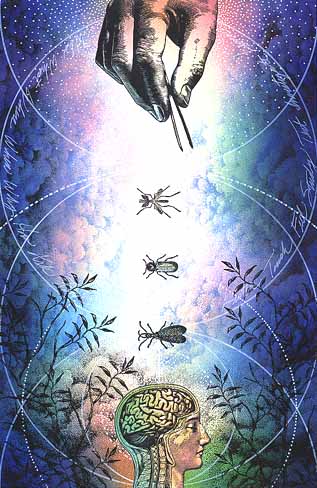
The
Hand of Science
My favorite poet is God above
Who gives Earth its rhythm and rhyme.
Nicely put and that is why I am a believer in the ancient concept of
Musica universalis:
Musica universalis (lit. universal music, or music of the spheres) is an ancient philosophical concept that regards proportions in the movements of celestial bodies ? the Sun, Moon, and planets ? as a form of
musica (the Medieval Latin name for music). This 'music' is not literally audible, but simply a harmonic and/or mathematical concept. The Greek mathematician and astronomer Pythagoras is frequently credited with originating the concept, which stemmed from his semi-mystical, semi-mathematical philosophy and its associated system of numerology of Pythagoreanism. According to Johannes Kepler, the connection between geometry (and sacred geometry), cosmology, astrology, harmonics, and music is through
musica universalis.
At the time, the Sun, Moon, and planets were thought to revolve around Earth in their proper spheres. The most thorough and imaginative description of the concept can be found in Dante's Divine Comedy. The spheres were thought to be related by the whole-number ratios of pure musical intervals, creating musical harmony. Johannes Kepler used the concept of the music of the spheres in his
Harmonice Mundi in 1619, relating astrology (especially the astrological aspects) and harmonics.
There are three branches of the Medieval concept of musica:
*
musica universalis (sometimes referred to as
musica mundana)
*
musica humana (the internal music of the human body)
*
musica instrumentalis (sounds made by singers and instrumentalists)
In 2006, an experiment conducted by Greg Fox divided the orbital periods of the planets in half again and again until they were literally audible. The resultant piece was "Carmen of the Spheres". The principle of octaves in music states that whenever a sound-wave is doubled or halved in frequency, it yields another pitch similar in 'flavour' to the original one. This can be applied (through very large octave shifts) to any periodic cycle, including the orbits of celestial bodies.
Cheers!

